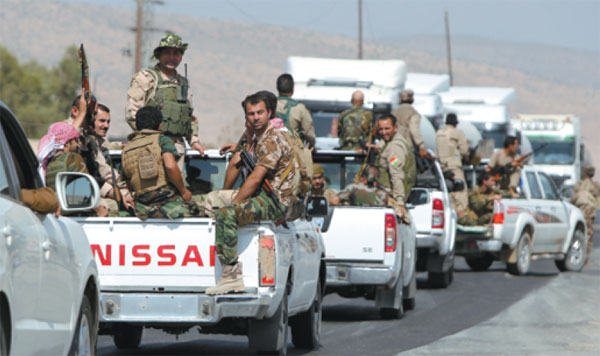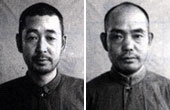Iraqi forces retake control of dam
By Agencies in Baghdad (China Daily) Updated: 2014-08-19 06:52
Iraqi security forces and Kurdish fighters on Monday wrested back control of the country's largest dam from the hands of Islamic militants who captured it less than two weeks ago, an Iraqi army spokesman in Baghdad said.
The development marks the biggest prize yet clawed back from the Islamic State jihadists since US airstrikes began earlier this month and could significantly boost their morale as they try to free territory overrun by the Islamic State group in a blitz this summer.
The Mosul Dam - spanning the Tigris River just north of Iraq's second-largest city of Mosul - and its broader complex hold great strategic value as they supply electricity and water to a large part of the country.
|
Iraqi Kurdish Peshmerga fighters head to the Mosul dam along the Tigris river that they recaptured from Islamic State jihadists on Sunday near the northern Iraqi city of Mosul. Ahmad Alrubaye / Agence France-Presse |
Alarmed by the militants advance, the US and Iraqi airstrikes pounded the area in the past two days. The US military said US forces conducted nine strikes on Saturday and another 16 on Sunday in efforts to help the Iraqis retake the dam.
Army spokesman Qassim al-Moussawi said that Kurdish peshmerga forces and Iraqi anti-terrorism troops "fully liberated" the dam on Monday and "hoisted the Iraqi flag over it".
Al-Mousawi added that the troops were backed by a joint aerial support, but he didn't specify whether there were any US airstrikes in the area of the dam on Monday.
US President Barack Obama told US Congress that the "limited" airstrikes he has authorized on Iraq to support the fight for the dam protected US interests there.
Highlighting the stakes at hand, Obama said: "The failure of the Mosul dam could threaten the lives of large numbers of civilians, endanger US personnel and facilities, including the US Embassy in Baghdad, and prevent the Iraqi government from providing critical services to the Iraqi populace."
Local residents could not immediately be contacted to confirm the security forces' recapture of the dam.
British Prime Minister David Cameron described the Islamic State fighters sweeping across Syria and Iraq as a direct threat to Britain, and said all available tools must be used to halt their advance.
Cameron, writing in the Sunday Telegraph, said that while it would not be right to send an army into Iraq, some degree of military involvement was justified due to the threat that an expanding "terrorist state" would pose to Europe and its allies.
The US launched airstrikes against the Islamic State group in Iraq more than a week ago in a bid to halt its advance across the north.
But the Sunni militants remain in control of vast swathes of northern and western Iraq, including the city of Mosul, as well as much of northeastern Syria.
Some 1.5 million people have been displaced by fighting in Iraq since the Islamic State's rapid advance began in June. The scale of the humanitarian crisis prompted the UN to declare its highest level of emergency lasts week.
The decision to launch airstrikes marked the first direct US military intervention in Iraq since the last US troops withdrew in 2011 and reflected growing international concern about the extremist group.
Reuters-AFP
(China Daily 08/19/2014 page12)











